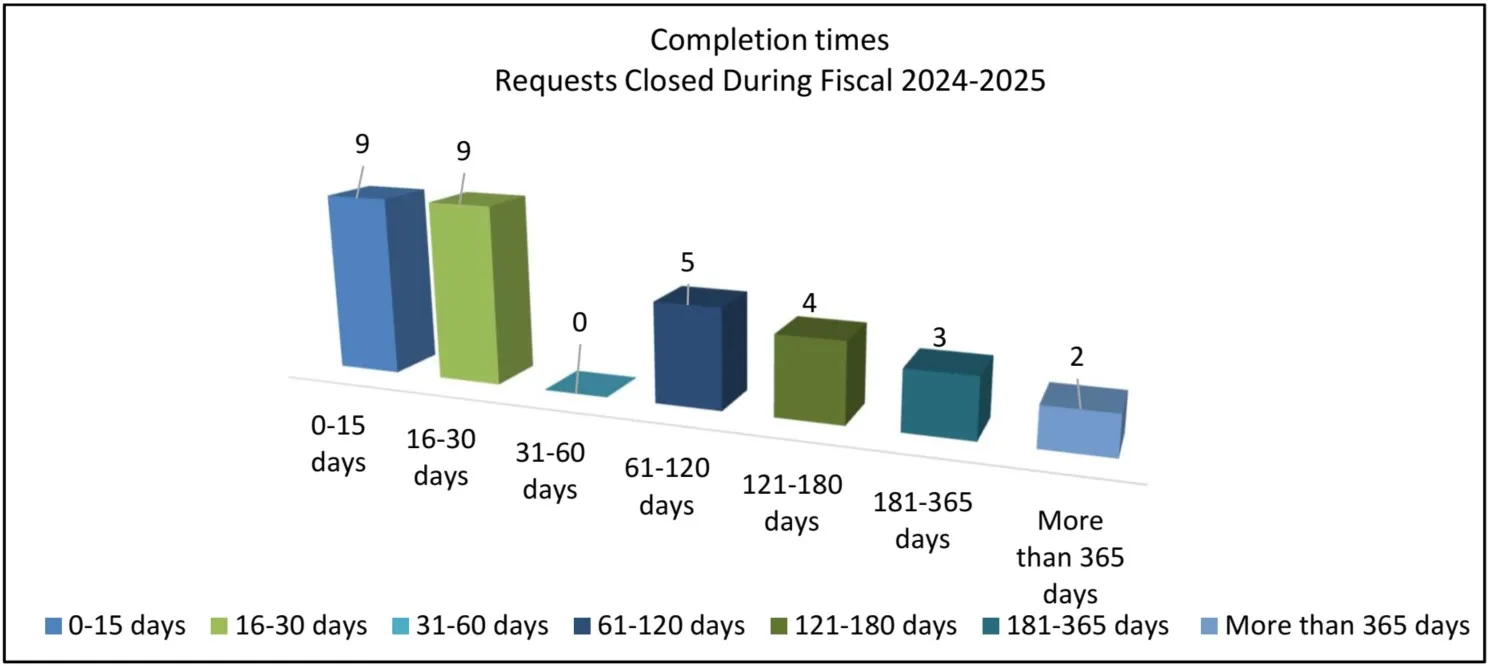
1. Introduction
This is the Canadian Human Rights Commission's (the Commission) Annual Report to Parliament, submitted pursuant to section 94 of the Access to Information Act.
The purpose of the Access to Information Act is to provide a right of access to information in records under the control of a government institution in accordance with the principles that government information should be available to the public, that necessary exceptions to the right of access should be limited and specific and that decisions on the disclosure of government information should be reviewed independently of government. It also sets out requirements for the proactive publication of information.
Section 94 of the Access to Information Act requires that the head of every government institution prepare, for submission to Parliament, an annual report on the administration of the Act within the institution during each fiscal year.
This report describes the work of the Commission's Access to Information and Privacy Office for the fiscal year 2024-2025.
About Us
The Commission protects and promotes human rights in Canada.
Our Mandate
We advocate for human rights, and provide enforcement and dispute resolution processes that are fair, equitable, and respect the inherent dignity of all.
We operate under the authority of the Canadian Human Rights Act, the Accessible Canada Act, the Employment Equity Act, the Pay Equity Act and the National Housing Strategy Act. We are internationally accredited as Canada's National Human Rights Institution.
2. Organizational Structure
The ATIP Office is organizationally housed within the IM/IT Division, which is part of the Corporate Management Branch. In fiscal year 2024-2025, the ATIP Unit was composed of an ATIP Coordinator, a Senior ATIP Analyst, an ATIP Analyst, and an ATIP Officer.
The ATIP Unit processes formal and informal requests, consultations and complaints the Commission receives pursuant to the Access to Information Act and the Privacy Act and produces Annual Reports and the Info Source in accordance with these Acts.
Furthermore, the ATIP Unit provides subject matter expert advice and training to all staff, compiles statistics as required and prepares weekly reports to provide updates with respect to the active access to information requests, consultations, and complaints submitted to the Office of the Information Commissioner for senior management.
In accordance with the Treasury Board Secretariat requirements, the ATIP Unit prepares the list of completed access to information requests and publishes them on Open Canada on a monthly basis.
The Commission fulfills its proactive publication requirements under Part 2 of the Access to Information Act by proactively publishing the required information by the required timelines. During the reporting period, the following offices were responsible for fulfilling the requirements set out in sections 82 to 88 of the Access to Information Act:
- Financial Services Division;
- Administrative Services Division;
- Planning and Performance Measurement Division; and
- Interim Chief Commissioner's office.
Lastly, the Commission was not a party to any service agreements under section 96 of the Access to Information Act during the reporting period.
3. Delegation Order
The Delegation Order sets out the powers, duties, and functions for the administration of the Access to Information Act that has been delegated by the head of the institution, the Interim Chief Commissioner.
The Interim Chief Commissioner has delegated her decision-making authority under the Access to Information Act to the Director General of the Corporate Management Branch. The power to process requests is delegated to the ATIP Office. As the functional delegate, the Director General oversees the processing of requests and the handling of complaints.
Please refer to Appendix A for a copy of the Signed Delegation Order.
4. Performance under Part 1 of the Access to Information Act, 2024–2025
During the period under review, April 1, 2024, to March 31, 2025, the Commission's total number of Access to Information requests were as follows:
- 41 new requests were received;
- 8 requests were outstanding from the previous reporting period; and
- 1 request was outstanding from more than one reporting period.
Of these, 32 requests were closed during this reporting period and 18 were carried over to the next reporting period as follows: 11 were carried over within legislated timelines and 7 were carried over beyond legislated timelines to the next reporting period (2025-2026).
All 8 requests that were outstanding from the previous reporting period were completed beyond legislated timelines and closed in fiscal year 2024-2025. An extension was taken on all 8 requests. The request outstanding from more than one reporting period was received in fiscal year 2023-2024 and was closed in fiscal year 2025-2026. An extension was taken on this request.
Out of the 41 new requests received during this period:
- 31 were made online;
- 4 were made by e-mail;
- 6 were mailed;
- 0 were made in person;
- 0 were made by phone; and
- 0 were received by fax.
The type of request sources of the 41 new requests received during this period were:
- 2 from Media;
- 2 from Academia;
- 2 from Business (Private Sector);
- 4 from Organization ;
- 20 from Public; and
- 11 Decline to identify.
During this 2024-2025 reporting period, the Commission received 1 more access to information requests than last reporting year representing a 3% increase.
Of the 32 requests closed during this period, 13,959 relevant pages were processed and 4,218 pages were released. The disposition and number of pages processed for each request was as follows:
- 2, or 6%, and totalizing 2 pages, were All disclosed;
- 16, or 50%, and totalizing 13,950 pages, were Disclosed in part;
- 0, or 0 %, were All exempted;
- 0, or 0%, were All excluded;
- 2, or 6%, were No records exist;
- 1, or 3%, was Request transferred to another federal government department;
- 6, or 19%, and totalizing 7 pages, were Request abandoned;
- 5, or 16%, were Neither confirmed nor denied; and
- 0, or 0%, were Declined to act with the approval of the Information Commissioner.
The completion times of the 32 access to information requests closed during this reporting period were as follows:
- 9 requests took 0 to 15 days;
- 9 requests took 16 to 30 days;
- 0 requests took 31 to 60 days;
- 5 requests took 61 to 120 days;
- 4 requests took 121 to 180 days;
- 3 requests took 181 days to 365 days; and
- 2 requests took more than 365 days.

Completion times Requests Closed During Fiscal 2024-2025 - Text version
| 0-15 days | 16-30 days | 31-60 days | 61-120 days | 121-180 days | 181-365 days | More than 365 days |
|---|---|---|---|---|---|---|
| 9 | 9 | 0 | 5 | 4 | 3 | 2 |
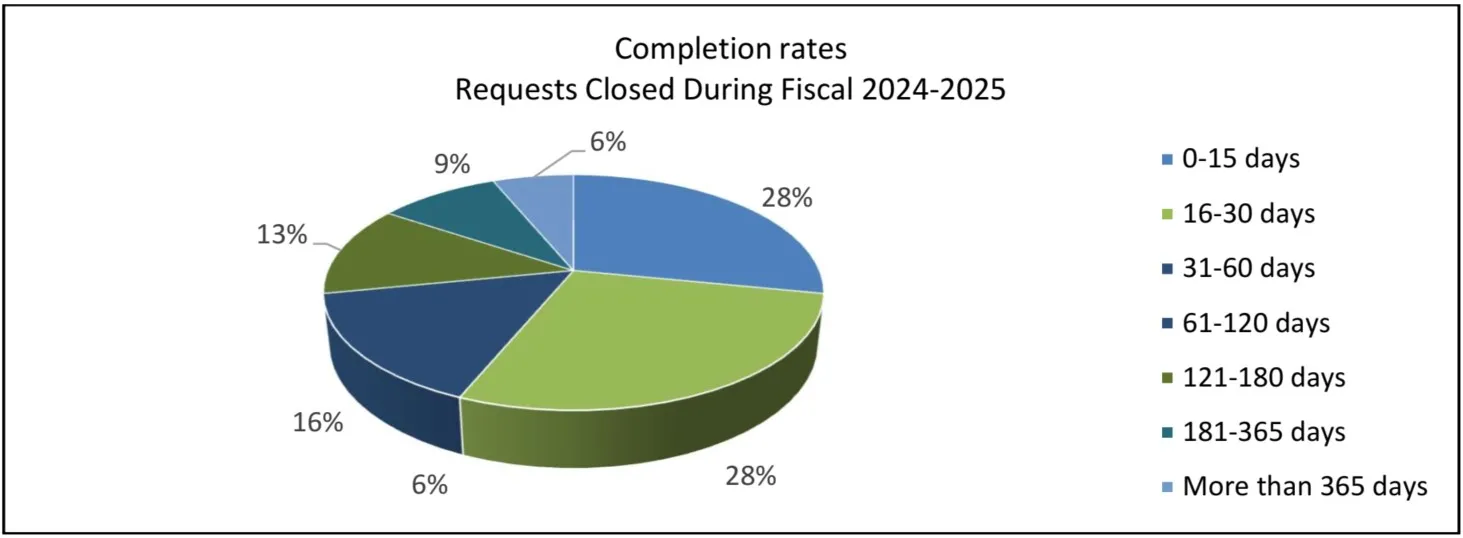
Completion rates Requests Closed During Fiscal 2024-2025 - Text version
| 0-15 days | 16-30 days | 31-60 days | 61-120 days | 121-180 days | 181-365 days | More than 365 days |
|---|---|---|---|---|---|---|
| 28% | 28% | 0% | 16% | 13% | 9% | 6% |
Consultations:
A consultation is when the record(s) responding to a particular request are transmitted from another organization (federal, provincial, territorial, municipal) to the Commission for review, and to advise recommendations if any exemptions are needed.
During this reporting period, the Commission received 8 consultation requests and 1 was outstanding from the previous reporting period and reviewed a total of 744 pages originating from other Government of Canada institutions. There were 8 consultations closed during the reporting period and 1 was carried over to the next reporting period. The completion times were as follows:
- 4 consultation requests took 0 to 15 days;
- 3 consultation requests took 16 to 30 days;
- 1 consultation requests took 31 to 60 days;
- 0 consultation requests took 61 to 120 days;
- 0 consultation requests took 121 to 180 days;
- 0 consultation requests took 181 to 365 days; and
- 0 consultation requests took more than 365 days.
The Commission had no concerns with the full disclosure of the records for 6 out of the 8 consultation requests closed during the reporting period, the Commission recommended a partial disclosure for 2 consultation requests.
Informal requests:
An informal request is a request for information that is not processed under the Access to Information Act. The administration fee cannot be charged for informal requests and there are no deadlines for responding. Also, the requester has no statutory right to complain to the Office of the Information Commissioner of Canada.
The Commission received 75 new informal requests during this reporting period and 1 was outstanding from the previous reporting period for a total of 76 informal requests, which were all closed during this reporting period.
Of the 76 informal requests closed during this period, 15,042 pages were re-released, and the completion times were as follows:
- 14 informal requests took 0 to 15 days;
- 24 informal requests took 16 to 30 days;
- 21 informal requests took 31 to 60 days;
- 15 informal requests took 61 to 120 days;
- 2 informal requests took 121 to 180 days;
- 0 informal requests took 181 to 365 days; and
- 0 informal requests took more than 365 days.
Multi-year trends
Figure 1 shows the number of requests received, processed, and closed during each fiscal year over the past five years. A higher number of requests was observed in 2020-2021, reaching 40, compared to the following 4 fiscal years, including the reporting year, which ranged from 32 to 34. The number of requests received, processed, and closed over the last 3 fiscal years has remained relatively stable.
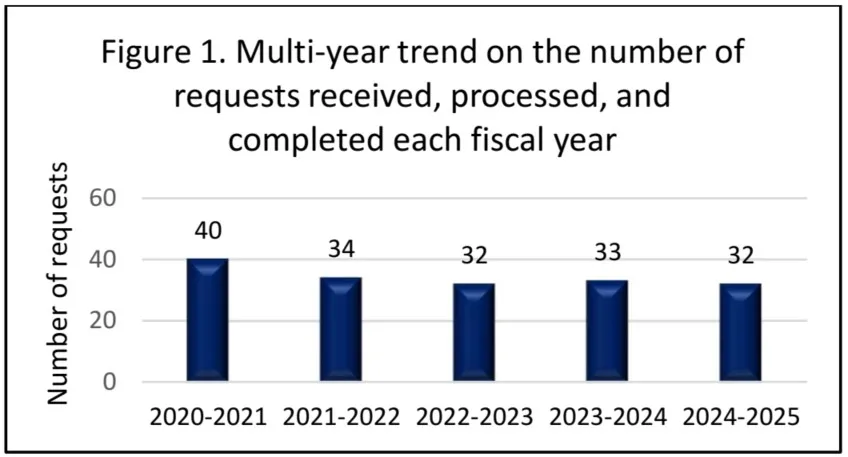
Figure 1. Multi-year trend on the number of requests received, processed, and completed each fiscal year - Text version
| 2020-2021 | 2021-2022 | 2022-2023 | 2023-2024 | 2024-2025 | |
|---|---|---|---|---|---|
| Number of requests | 40 | 34 | 32 | 33 | 32 |
Figure 2 shows the number of consultations processed during each reporting period for the past five years. This includes those received during the 2024-2025 fiscal year and those carried over from previous years. Higher number of consultations were observed in 2020-2021 (16) and in 2023-2024 (17), compared to the other fiscal years, which ranged from 9 to 12. While there is no consistent pattern in these figures that allows for establishing a specific trend, it is observed that this number has decreased in the reporting period, from 17 in the previous reporting period to 9.
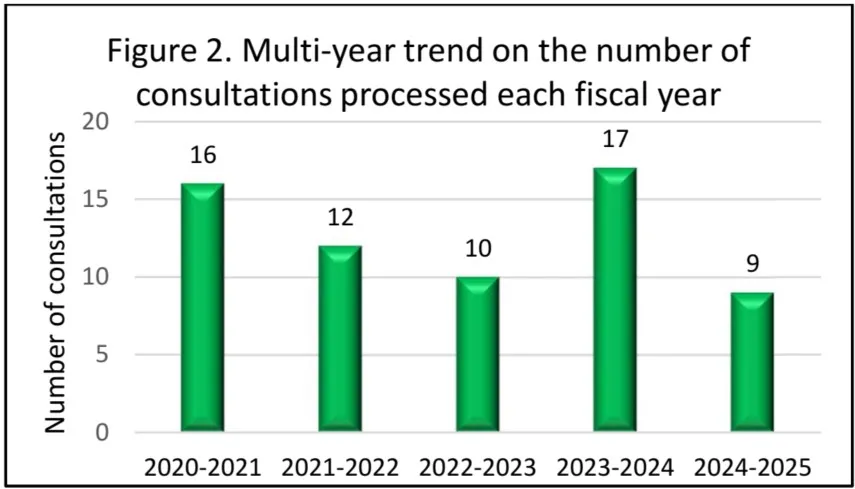
Figure 2. Multi-year trend on the number of consultations processed each fiscal year - Text version
| 2020-2021 | 2021-2022 | 2022-2023 | 2023-2024 | 2024-2025 | |
|---|---|---|---|---|---|
| Number of consultations | 16 | 12 | 10 | 17 | 9 |
Concerning Figure 3, the graph shows the number of complaints processed during each reporting period over the past five years, including those received in 2024-2025 and carried over from previous years. The Commission received 2 new complaints during the reporting period, and 1 complaint carried over from previous fiscal years was closed in this reporting period. This is further explained on page 9. We can observe that the number of complaints processed in the past three fiscal years has decreased, from 7 to 3 in 2025-2024, compared to 9 in fiscal year 2020-2021, and 13 in 2021-2022.
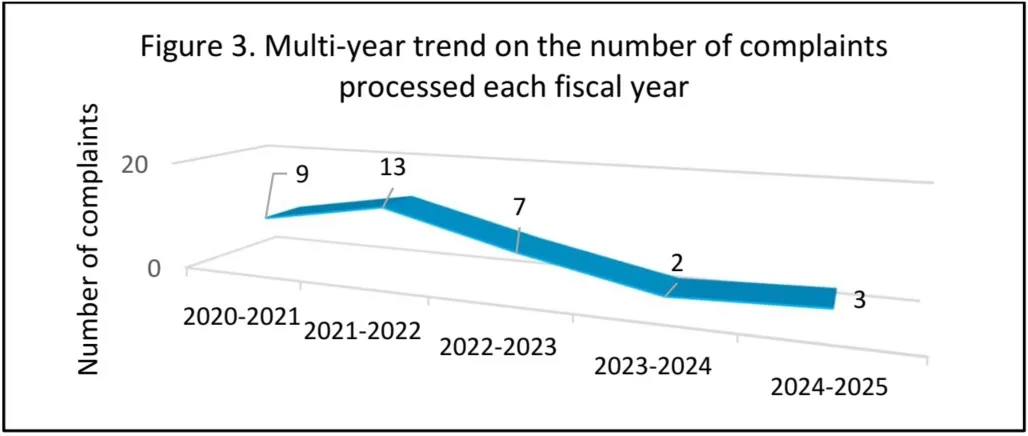
Figure 3. Multi-year trend on the number of complaints processed each fiscal year - Text version
| 2020-2021 | 2021-2022 | 2022-2023 | 2023-2024 | 2024-2025 | |
|---|---|---|---|---|---|
| Number of complaints | 9 | 13 | 7 | 2 | 3 |
Requests closed past the legislated timelines
The Commission is committed to completing requests in a timely fashion. During this reporting period, 20 requests, or 62.5%, were closed within the legislated timelines, while 12, or 37.5%, were closed past the legislated timeline. The details are explained in the following table and further expanded below.
| Number of requests closed past the legislated timeline | Principal Reason | |||
|---|---|---|---|---|
| Interference with Operations / Workload | External Consultation | Internal Consultation | Other | |
| 12 | 11 | 1 | 0 | 0 |
Out of the 12 requests that were closed past the statutory deadline, the Commission took an extension on 11 requests pursuant to s. 9(1)(a) because meeting the original time limit would unreasonably interfere with the operations of the institution. The Commission took an extension on 1 request to consult with another federal government institution.
Extensions taken on requests closed within legislated timelines
The Commission took extensions on 3 requests pursuant to s. 9(1)(a) because meeting the original time limit would unreasonably interfere with the operations of the institution.
Application of Exemptions
Partial exemptions claimed under the Access to Information Act were invoked in 16 requests. For some requests, more than one exemption was invoked.
| Sections of the Access to Information Act | Number of requests |
|---|---|
| Paragraph 15(1) – International affairs and defence - The head of a government institution may refuse to disclose any record requested under this Part that contains information the disclosure of which could reasonably be expected to be injurious to the conduct of international affairs, the defence of Canada or any state allied or associated with Canada or the detection, prevention or suppression of subversive or hostile activities, including, without restricting the generality of the foregoing | 1 |
| Section 17 – Safety of individuals - The head of a government institution may refuse to disclose any record requested under this Part that contains information the disclosure of which could reasonably be expected to threaten the safety of individuals. | 3 |
| Subsection 19(1) – Personal information – Subject to section 2, the head of a government institution shall refuse to disclose any record requested under this Part that contains personal information. | 15 |
| Paragraph 20(1)(b) – Third party information - Subject to this section, the head of a government institution shall refuse to disclose any record requested under this Part that contains financial, commercial, scientific or technical information that is confidential information supplied to a government institution by a third party and is treated consistently in a confidential manner by the third party | 1 |
| Paragraph 21(1)(a) – Advice, etc. – The head of a government institution may refuse to disclose any record requested under this Part that contains (a) advice or recommendations developed by or for a government institution or a minister of the Crown | 5 |
| Paragraph 21(1)(b) – Advice, etc. – The head of a government institution may refuse to disclose any record requested under this Part that contains an account of consultations or deliberations in which directors, officers or employees of a government institution, a minister of the Crown or the staff of a minister participate | 1 |
| Section 23 – Protected information — solicitors, advocates and notaries – The head of a government institution may refuse to disclose any record requested under this Part that contains information that is subject to solicitor-client privilege or the professional secrecy of advocates and notaries or to litigation privilege. | 8 |
| Subsection 24(1) – Statutory prohibitions against disclosure – The head of a government institution shall refuse to disclose any record requested under this Part that contains information the disclosure of which is restricted by or pursuant to any provision set out in Schedule II. | 2 |
Legal Advice Sought
During the reporting period, legal advice was requested 10 times for issues regarding the Access to Information Act.
5. Training and Awareness
The ATIP Unit provides policy and processing advice to the Commission staff on the Access to Information Act as needed. During fiscal year 2024-2025, the ATIP Unit published several messages regarding the ATIP process and best information management practices in the Commission's monthly newsletter.
Furthermore, during fiscal year 2024-2025, Commission staff were required to complete the Access to Information and Privacy Fundamentals and Fundamentals of Information Management online courses offered by the Canada School of Public Service (CSPS) as part of their mandatory learning and training to raise awareness about ATIP and information management practices.
Proactive Publication, pursuant to Part 2 of the ATIA, is overseen by Finance for sections 82 to 84 and 86 of the Act, by Human Resources for section 85, and by the office of the Interim Chief Commissioner for section 88 of the Act. Each office follows the guidelines and structure received from the Treasury Board Secretariat for each mandatory publication when complying with each publication requirement.
Employees wanting more training for their personal and professional development are also referred to the Treasury Board Secretariat training calendar and the Canada School of Public Service.
6. Policies, Guidelines, and Procedures
There were no new or revised institution-specific policies, guidelines and written procedures related to access to information that were implemented in the institution during the reporting period.
There were no new procedures or systems put in place to meet proactive publication requirements under Part 2 of the Access to Information Act.
7. Initiatives and Projects to Improve Access to Information
The Commission fully implemented its new Request Processing Software Solution (RPSS) ATIPXpress and used it to process all new ATIP requests received during the reporting period. The new system helps the ATIP Unit automate a number of routine ATIP operations that were completed manually in the previous case management system. For example, ATIPXpress automatically indexes records as they are ingested into the system. It also identifies most duplicate documents during the ingestion, and the overall accessibility of the released records has been improved.
8. Summary of Key Issues and Actions Taken on Complaints
The Commission received 2 new complaints during the reporting period. In addition, the Commission worked on 1 complaint that was carried over from previous fiscal years, which was closed in 2024-2025. The key issues were as follows:
| COMPLAINTS RECEIVED IN FISCAL YEAR 2024-2025 | REASON FOR COMPLAINT | STATUS |
|---|---|---|
| Received April 3, 2024 | Time limits - Delay |
|
| Received April 3, 2024 | Time limits - Delay |
|
| COMPLAINTS CARRIED FORWARD FROM FISCAL YEAR 2022-2023 | REASON FOR COMPLAINT | STATUS |
|---|---|---|
| Received April 7, 2022 | Refusal |
|
9. Proactive Publication under Part 2 of the Access to Information Act
| Legislative Requirement | Section of ATIA | Publication Timeline | Does requirement apply to your institution? (Y/N) | Internal group(s) or positions(s) responsible for fulfilling requirement | % of proactive publication requirements published within legislated timelines | Link to web page where published |
|---|---|---|---|---|---|---|
| Apply to all Government Institutions as defined in section 3 of the Access to Information Act | ||||||
| Apply to government entities or Departments, agencies, and other bodies subject to the Act and listed in Schedules I, I.1, or II of the Financial Administration Act | ||||||
| Applies to government institutions that are departments named in Schedule I to the Financial Administration Act or portions of the core public administration named in Schedule IV to that Act (i.e. government institutions for which Treasury Board is the employer) | ||||||
| Apply to Ministers’ Offices (therefore apply to any institution that performs proactive publication on behalf of a Minister’s Office) | ||||||
| Travel Expenses | 82 | Within 30 days after the end of the month of reimbursement | Y | Financial Services Division | 67% | Government Travel Expenses |
| Hospitality Expenses | 83 | Within 30 days after the end of the month of reimbursement | Y | Financial Services Division | N/A (no expenses were reported in 2024-25) | |
| Reports tabled in Parliament | 84 | Within 30 days after tabling | Y | Planning and Performance Measurement Division | 100% | |
| Contracts over $10,000 | 86 | Q1-3: Within 30 days after the quarter Q4: Within 60 days after the quarter | Y | Administration Services Division | 100% | Contracts over $10,000 |
| Grants & Contributions over $25,000 | 87 | Within 30 days after the quarter | N | |||
| Packages of briefing materials prepared for new or incoming deputy heads or equivalent | 88(a) | Within 120 days after appointment | Y | Interim Chief Commissioner’s office | N/A (there were no briefing materials prepared for an incoming deputy head in 2024-25) | |
| Titles and reference numbers of memoranda prepared for a deputy head or equivalent, that is received by their office | 88(b) | Within 30 days after the end of the month received | Y | Interim Chief Commissioner’s office | 100% | Activity Stream - Proactive Publication - Briefing Note Titles and Numbers - Canadian Human Rights Commission - Open Government Registry |
| Packages of briefing materials prepared for a deputy head or equivalent’s appearance before a committee of Parliament | 88(c) | Within 120 days after appearance | Y | Interim Chief Commissioner’s office | 0% (1 package of briefing materials was prepared and will be published in 2025-26) | |
| Reclassification of positions | 85 | Within 30 days after the quarter | Y | Administration Services Division | 100% | OpenCanada.ca |
| Packages of briefing materials prepared by a government institution for new or incoming ministers | 74(a) | Within 120 days after appointment | N | |||
| Titles and reference numbers of memoranda prepared by a government institution for the minister, that is received by their office | 74(b) | Within 30 days after the end of the month received | N | |||
| Package of question period notes prepared by a government institution for the minister and in use on the last sitting day of the House of Commons in June and December | 74(c) | Within 30 days after last sitting day of the House of Common in June and December | N | |||
| Packages of briefing materials prepared by a government institution for a minister’s appearance before a committee of Parliament | 74(d) | Within 120 days after appearance | N | |||
| Travel Expenses | 75 | Within 30 days after the end of the month of reimbursement | N | |||
| Hospitality Expenses | 76 | Within 30 days after the end of the month of reimbursement | N | |||
| Contracts over $10,000 | 77 | Q1-3: Within 30 days after the quarter Q4: Within 60 days after the quarter | N | |||
| Ministers’ Offices Expenses Note: This consolidated report is currently published by TBS on behalf of all institutions. | 78 | Within 120 days after the fiscal year | N | |||
10. Monitoring Compliance
Requests are monitored daily. Information about the different processing stages is entered into the Commission's case management system. Weekly reports of the open requests and complaints are generated and shared with the team, the ATIP Coordinator, and the ATIP Delegate.
Delays in processing requests primarily occur when consultations are needed or when handling voluminous records. When it appears that a delay in processing a request is inevitable, the ATIP staff contacts the requester. If the requester cannot be reached, the ATIP Coordinator is notified of any concerns. If necessary, the ATIP Delegate is notified to ensure that the request is being processed in a reasonable period. The ATIP Delegate will bring any issues to the Executive Director's attention and the Executive Director will discuss them with the Chief Commissioner, as required.
The proactive publication of information under Part 2 of the Access to Information Act is monitored by the Commission for its accuracy and completeness while ensuring that the materials are published within the established timelines. Various consultations and verifications of the information required for publication are carried out internally within each division's case management system, and BF processes are followed to meet established publishing deadlines. All information is approved by senior management prior to its publication. This monitoring process provides sufficient oversight at the organizational level before any information is published on Open Canada.